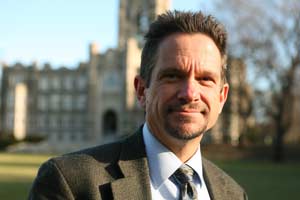
Photo by Michael Dames
War. Economic woes. Environmental degradation. Nuclear proliferation.
Americans have a lot on their minds these days.
Then again, they always have. The Civil War nearly rent the country in two in the 1860s, and neither World War II nor the social upheavals of the 1960s were easy on the national psyche. Even 9/11 had somewhat of a precursor in Pearl Harbor.
Even though there have always been stressful issues, a new kind of anxiety has surfaced recently in the United States, according to Kirk Bingaman, Ph.D., assistant professor of pastoral counseling and director for Fordham’s pastoral counseling program in the Graduate School of Religion and Religious Education (GRE).
The culprit isn’t the crumbling of institutions such as schools, churches and social groups, but the quickening pace of life. Americans are so plugged into the ups and downs of the planet; they have a difficult time piecing together the meaning of it all.
“There’s media bombardment, and our psychological and spiritual capacities are saturated,” Bingaman said. “Each day brings a different set of global issues and crisis. We don’t have the time to keep up with them, let alone attach any meaning to these events.”
Building upon the ideas of the French anthropologist Marc Auge, Bingaman has embraced what is known as super-modernity, which is not to be confused with the collapse of traditional hierarchy described by post-modernism.
“It’s a collapse of an idea of progress,” he said. “It’s not the loss of meaning. It’s this rapid acceleration of meaning, almost an excess of meaning.
“We have a deep desire to give meaning to these momentous events in the world like terrorism, global warming, the changing economics, the vanishing middle class and the haves and the have nots. In a sense, it feels like we’re in over our heads.”
Bingaman notes that some of this anxiety stems from the natural fears of terrorism that were ignited by 9/11, but also from “fear entrepreneurs,” which are politicians, businesses and advocacy groups that promote causes and products through fear. It’s not just a phenomenon of New York City or Washington D.C., either. Bingaman said he had clients who became more anxious, more agitated and more on edge while he was a pastoral counselor in the San Francisco Bay area.
“It was not just my diagnosis; they were admitting this themselves, like, ‘I don’t know what it is; there’s just something; I’m just not as hopeful; or I just feel disoriented, like I’ve lost my bearings; this country’s lost its bearings,’” he said.
The solution, which he proposes in Treating the New Anxiety: A Cognitive-Theological Approach (Jason Aronson, 2007), is encouraging mental health professionals to help clients explore beliefs that give their lives meaning, including religious beliefs.
“If you’re a pastoral counselor, that’s easy enough. If you’re a psychotherapist, there’s the question, ‘Is that something that we do in therapy, or is that something that we let the client do with his or her priest, minister or rabbi?’
“Unfortunately, there’s been a diminishment in religious involvement,” Bingaman said. “So if someone is in a faith community, that’s fine, they can take it up with their clergy. But a lot of people aren’t. So if we’re not willing to engage them in the area of core beliefs and meaning making, then I would say that, as they leave the session, maybe they’ve addressed this or that, but the anxiety is left untreated.”
Bingaman is well acquainted with psychoanalysis, as evidenced by his previous book, Freud and Faith: Living in the Tension (State University of New York Press, 2003). Both books provide a framework for caregivers who want to challenge the conventional thinking that faith in God and psychology are incompatible.
“Here’s psychoanalysis in the first book; along with religion. Not the most comfortable bedfellows, right? But I think religious people can learn from Freud and psychoanalysis, and vice versa,” he said. “Paul Ricoeur, the philosopher and theologian, says it’s a clash of opposites, and in that it’s energizing. We learn new things. It pushes us beyond where we’ve been.”
Befitting that notion, Bingaman, who is an ordained minister and a licensed mental health counselor in New York state, credits Fordham psychology professor Warren Tryon, Ph.D., with helping him understand how cognitive behavioral therapy emphasizes getting at clients’ core beliefs. Just as he feels that psychotherapists can learn from pastoral caregivers, he feels the reverse is also true.
“I’d always be thinking, ‘There are a lot of people in the psychological sciences, social sciences and natural sciences who’ve been critiquing faith, and if we want it to be really relevant in this new world we’re in, we can’t keep it over here, hidden in a corner,’” he said. “Freud, for example, issued a devastating critique of religion, andwe have to respond to that.”
With the book published, Bingaman’s attention is focusing on the GRE’s pastoral counseling program, which recently received New York state accreditation. His next book will touch on the role of religion in popular culture. He’s also contributing a chapter to a new book about Sigmund Freud, The Paradoxical Freud, which will examine claims that the father of psychoanalysis was not a pure atheist as most think.
“If religion is irrelevant and passé as he suggested, why did Freud spend so much of his life focusing on it?”
